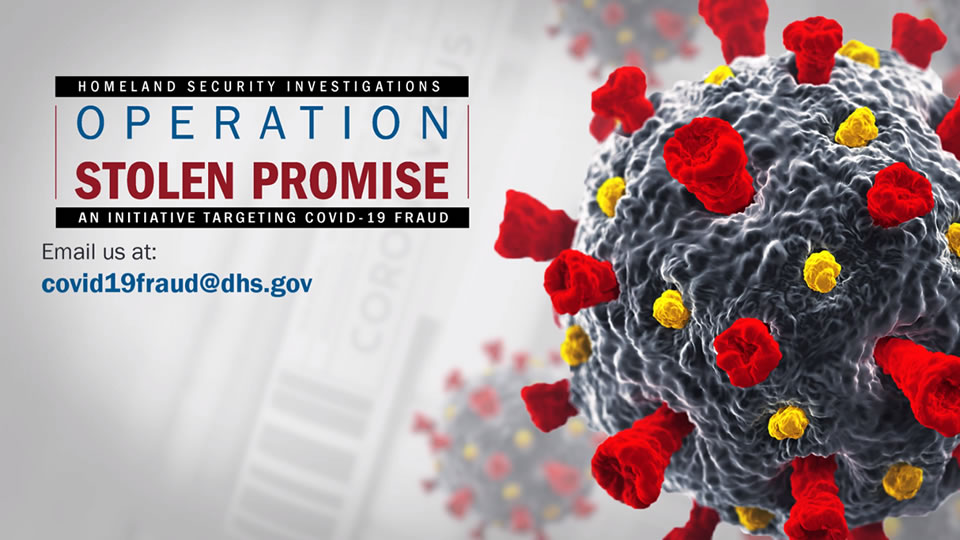WASHINGTON — In the midst of on-going efforts to vaccinate the U.S. population against COVID-19, reports are surfacing about a scam targeting vulnerable consumers with promises of gifts and cash for taking a fraudulent post-vaccination survey.
The reality is that these fraudulent surveys are used to unlawfully capture consumers’ personal information and potential steal money from consumers.
“Fraudulent schemes like this emphasize the need to remain vigilant of those trying to profit from the most vulnerable in the midst of a pandemic. HSI has been at the forefront of the government’s investigative response to COVID-19 related crime since the onset of the pandemic and will remain a leader in the fight to prevent fraudulent activity under the guise of protecting the health and safety of our population,” said Steve Francis, IPR Center director.
The National Intellectual Property Rights Coordination Center (IPR Center), Department of Justice (DoJ) and the leading manufactures of the COVID-19 vaccine, are investigating reports of these fraudulent COVID-19 vaccine surveys enticing consumers to provide personal information with the promise of a prize or cash at the conclusion of the survey.
Consumers receive the surveys via email and text message, and are told that, as a gift for filling out the survey, they can choose from various free prizes, such as an iPad Pro. The messages claim that the consumers need only pay shipping and handling fees to receive their prize. Victims provide their credit card information and are charged for shipping and handling fees, but never receive the promised prize. Victims also are exposing their personally identifiable information (PII) to scammers, thereby increasing the probability of identity theft.
Unless from a known and verified source, consumers should never click on links in text messages or emails claiming to be a vaccine survey.
Schemes that use links embedded in unsolicited text messages and emails in attempts to obtain personally identifiable information are commonly referred to as phishing schemes. Phishing messages may look like they come from government agencies, financial intuitions, shipping companies, and social media companies, among many others. Carefully examine any message purporting to be from a company and do not click on a link in an unsolicited email or text message. Remember that companies generally do not contact you to ask for your username or password. When in doubt, contact the entity purportedly sending you the message, but do not rely on any contact information in the potentially fraudulent message.
Tips to avoid being victimized
Currently, no post-vaccine surveys are being conducted by Pfizer, Moderna or Johnson & Johnson. Any emails or text messages that purport to be sent on behalf of these companies seeking personal financial information is illegitimate and fraudulent as these companies would never request an advanced payment for shipping or other expenses. Do not open the messages or provide any personal information, including credit card and/or bank information.
What to do if you are a victim
If you are a victim of these post-vaccine survey scams:
- Report the activity to the online payment service used for the financial transaction
- Contact your financial institution upon discovering any fraudulent or suspicious activity within your account(s)
- If you receive a text message or email claiming to be a COVID-19 vaccine survey and containing a link or other contact information, please report the communication to the IPR Center at IPRCenter.gov
- Consumers can also report suspected illicit criminal activity or fraudulent schemes related to the COVID-19 pandemic, by emailing Covid19Fraud@dhs.gov
This consumer public health and safety warning is being provided by the IPR Center and Consumer Protection Branch of the DoJ’s Civil Division.
About National Intellectual Property Rights Coordination Center
The National Intellectual Property Rights Coordination Center, working collaboratively with its public and private sector partners, stands at the forefront of the United States government’s response to combatting global intellectual property theft and enforcing intellectual properties rights violations. The IPR Center was established to combat global intellectual property theft – and, accordingly, has a significant role policing the sale and distribution of counterfeit goods on websites, social media, and the dark web.
About Consumer Protection Branch
The Consumer Protection Branch leads Department of Justice efforts to enforce laws that protect Americans’ health, safety, economic security, and identity integrity. To accomplish its mission, the Branch brings both criminal and affirmative civil enforcement cases throughout the country. The Branch uses its strong relationships with U.S. Attorneys’ Offices and investigative agencies, expertise with complex litigation, and nationwide reach to respond nimbly to emerging consumer threats.
About Homeland Security Investigations
Homeland Security Investigations (HSI) is a directorate of U.S. Immigration and Customs Enforcement (ICE) and the principal investigative arm of the U.S. Department of Homeland Security, responsible for investigating transnational crime and threats, specifically those criminal organizations that exploit the global infrastructure through which international trade, travel, and finance move. HSI’s workforce of over 10,400 employees consists of more than 7,100 Special Agents assigned to 220 cities throughout the United States, and 80 overseas locations in 53 countries. HSI’s international presence represents DHS’s largest investigative law enforcement presence abroad and one of the largest international footprints in U.S. law enforcement.



